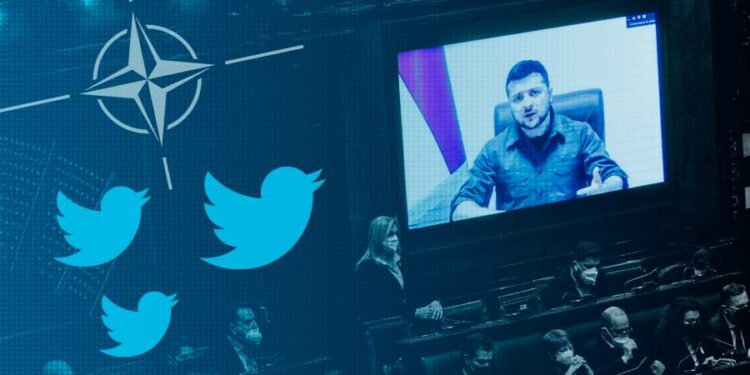After Russia invaded Ukraine, a woman purporting to be an Indian doctor took to Twitter to profess support for President Vladimir Putin. #IStandWithPutin, she wrote, and linked to a video of the leader justifying his actions. It went viral, as did the hashtag.
But the profile picture of “Dr Adhira” showing a woman in a blue jumper and a face mask was a stock photo lifted off the internet, researchers said. The picture had been reversed, in an attempt to evade image searches. She had fewer than 100 followers. After racking up more than 5,000 retweets, the account was deleted.
By the time Twitter had suspended dozens of accounts promoting the hashtag over concerns that its platform was being manipulated, the daughter of former South African president Jacob Zuma had tweeted the hashtag.
With President Volodymyr Zelensky’s emotive and direct speeches to parliaments around the world, Ukraine has won the information war in western countries. Its messaging has been amplified by western governments and media, which are sympathetic to its requests for help and support. But in some countries in Africa and Asia that have grappled with the legacy of western colonialism and military interventions, such as the 2003 US-led invasion of Iraq, views have been more divided.
“I don’t think it’s an absence of sympathy with Ukraine per se, but rather indicative of anger and frustration with Nato and the so-called west, especially after there seemed to be so much unanimous consent in support for Ukraine,” said Marc Owen Jones, an expert in online disinformation and an assistant professor at Qatar’s Hamad Bin Khalifa University.
“It just highlighted how the international community is capable of mobilising when the issue is closer to the ‘global north’ and reminds others in places like Africa of a tendency to ignore the continent, or exploit it.”
The diversity of opinion was made clear during a UN vote condemning Russia’s invasion of Ukraine on March 2 where 141 countries voted in favour, five countries voted against and 35 abstained, including India and China.
In this context, influence campaigns — either orchestrated by activists or manufactured by government propaganda machines — fall on fertile ground. While the Twitter campaign was redolent of past influence campaigns using fake or deceptive accounts blamed on Russia in the Middle East and Africa, there is no proof tying it to the Kremlin. As Shelby Grossman, a research scholar at Stanford Internet Observatory, pointed out: “There is authentic support for Russia in many parts of the world, including parts of Africa.”
Sometimes the boundaries are blurred. “Dr Adhira” may well have been a fake account, said Jones, who first flagged it as suspicious. And many, but not all, of the accounts that retweeted her post had the hallmarks of “astroturfing”, a term for a fake grassroots campaign. But authentic accounts also shared the hashtag, as did marketing bots. “There is no smoking gun [linking it to Russia],” said Carl Miller, research director at the Centre for the Analysis of Social Media, which published a report on the campaign.
Whoever started it, the messaging has found a ready audience in India. By withstanding western pressure to condemn Russia, Prime Minister Narendra Modi has generated rare cross-party support.
In South Africa, politicians have piggybacked on interest in the Russia-Ukraine war to promote local political causes, said Jean le Roux, a South Africa-based disinformation researcher for US think-tank Atlantic Council.
Beyond the hashtag, Dudu Zuma-Sambudla told her nearly 200,000 followers that Putin was “the most powerful man in the world”, while her father’s successor Cyril Ramaphosa was a “clown president”. Populist South African politician Julius Malema turned to history to justify his defence of Russia, which “equipped us with weapons, gave us money to fight apartheid”.
Ultimately, the Russian narrative of the war is being used to promote “existing anti-western messages”, said Le Roux. “Russia is seen as the alternative to the west.”
In the Middle East, views towards Russia are sharply polarised because of its military support for Syrian president Bashar al-Assad. But many, including in Gulf countries that have sought to balance their relationships with the US and Russia, questioned on social media the differences in response to the devastating US war on Iraq in 2003.
In some instances, official Russian social media accounts have simply amplified local news content. “The ongoing war in Ukraine has exposed the racism against non-Europeans,” the Russian embassy in Cairo tweeted, linking to a video segment produced by a radio station in Jordan that said as Europeans Ukrainians received more media attention than victims of wars in the Middle East.
Researchers caution about overinflating the impact of such campaigns. “This is the million dollar question: do these campaigns have any sort of impact? It’s extremely difficult to know,” said Grossman.











